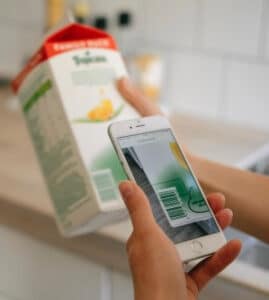It has given me a lot of inspiration and great energy to be part of the team in Kolonial.no. This is what André Knüppel says, one year after he joined as production director (COO) in Norway’s by far the largest and fastest growing grocery store online. The organization has taken seven-mile steps in development, both in the last year and in the five years since its establishment.
When will the store become profitable?
Knüppel has faith in profitability in the concept. At the C2U Knowledge Forum at Fornebu on 11 October, he explains why. When the high-profile Swedish investor Kinnevik Group has now entered Kolonial.no heavily, “everyone’s” eyes are on the company. – Do they live up to expectations? Do they manage the impossible, to make online grocery shopping a profitable business? We want to know.
To take the simplest first. When will you be profitable?
– In the future, Knüppel answers.
This is the standard answer to a question he and the rest of the management team receive almost daily. Inaccurate as it is, the answer at the same time expresses a belligerent belief that they will succeed.
– If I had not believed that this will be a success, I would not have been here. If we live up to expectations, others must respond. What is certain is that we have a good dialogue with the owners, both the new ones and those who have been involved from the beginning. I feel that we have great trust from the shareholders. Of course, I can not go into detail about what that trust is based on, but I am confident, he says.
Distinctive industry
The grocery trade has its own peculiar industry challenges, which also set governing premises when such a business is to be moved online. There are factors such as large variations in customers’ purchases, from small, fragmented purchases to wholesalers. All transactions must be handled in the shortest possible time, large parts of the day, and the online customer must be able to shop both via the browser he or she prefers to use, or via the mobile app on the preferred platform.
– From a start-up period with trial and error and above all fast learning, we have entered a period of systematic improvement work. Many people forget that the logistics industry has not built much experience with Lean. Continuous Improvement has been virtually non-existent. This means that we have a lot to tackle and have many opportunities to get better.
– Over the last couple of years, there have been major improvements. Only by improving methodology and working methods have we already made great progress. Yet we are only at the beginning. One of the things that inspires me is to see that the entrepreneurial team has done so much right from the beginning. This despite the fact that none of them had experience from the grocery trade when they threw themselves into it. They have experience from leading industrial production, as managers and consultants. It shows, says Knüppel.
Great potential for improvement
Is this what makes you believe so strongly in the investment?
– No, I have considered several factors. When I came here as a consultant, I had visited a large number of players in the industry. I had a good basis for comparison. I saw that in addition to a fantastically strong entrepreneurial team, Kolonial.no had an enormous potential for improvement and a very strong technological capability. Many technological solutions were developed in-house. When we now connect new, strong Lean expertise with the ability to develop new technological solutions, we create a basis for significant innovations, he says.
– What will be the next step you take?
– That is the big question, something many would like to know. Of course, we look closely at the opportunities we can find in technological solutions that allow us to simplify and improve the flow in the value chain even more than we have achieved so far. – One opportunity is to go the same way as Amazon.com, to diversify, go from one to several verticals?
– We are in dialogue with our new owners about current strategies. We already have our own bakery and our own supplier of fruit and vegetables. For example, we sell far more flowers to our customers than other grocery stores. We are now actively looking at which new product groups we should focus on. With 200 cars in daily shuttle traffic in Eastern Norway, it is clear we have many opportunities. In principle, the cars can take anything with them, he says.
From the media industry
Not long ago, Kolonial.no brought in its new product director from the media industry. An interesting choice, we think.
– What parallels do you see between the media industry and grocery shopping online?
– If you compare the production of online newspapers with our industry, you can say that the editor-in-chief corresponds to the production manager with us, ie my function. It’s about knowing the customer’s behavior.
In our case: When do they shop, how do they shop, what do they expect? etc.
– We need to collect and systematize data to be able to meet the customer’s needs, but also to be able to improve the value stream by optimizing productivity, development and distribution. Customers who shop for food online are happy to shop for food at the beginning of the week. Monday is by far our busiest delivery day.
– It can quickly become a problem, and by using data from registration of customer behavior, we will be able to influence the behavior so that deliveries can be spread over several days. In the same way that online newspapers have undergone a constant development to the adaptable products we see today, we can shape our deliveries by partly adapting ourselves, and partly influencing customers’ shopping habits online. That is why the collaboration between technology and production is so important for the success of online grocery shopping, says André Knüppel.

